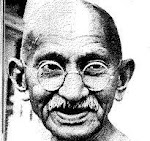Some time ago I read a book that really grabbed me (in terms of its honesty regarding the Church) and I decided to write a series of brief commentaries about it. For Christian peacemakers, this book (A Political Reading of the Life of Jesus) is a "must read". It makes a compelling case for recovering the church that challenges (as Jesus did) the Powers and Prinicipalities (rather than sleeping with them). And so, here is the first commentary for you reading pleasure.
*****************
“Enter through the narrow gate: for the gate is wide and the road is easy that leads to destruction, and there are many who take it. For the gate is narrow and the road is hard that leads to life, and there are few who find it." – Jesus
So begins the introduction to A Political Reading of the Life of Jesus, by George W. Baldwin called, (iUniverse, C2006). For those of us who have a spiritual calling to peace and justice work, it comes as no surprise that Jesus was political; that he pursued liberation and freedom by “confronting the systemic evil which was deeply rooted in the religious systems and governance structures” of his time, and which have continued to exist to this very day.

However, the notion of Jesus being one who promoted “The Politics of Liberation and Freedom, The Theology of Grace and The Methodology of Non-violent Love” (which Baldwin describes) is not one with which the church (as we know it) is at all comfortable or wishes to engage in dialogue about to any large degree. That is not to say the Church does not do good works; it does many good works, mostly acts of mercy. There is an inherent imbalance between its acts of mercy and its acts of justice. We must be realistic enough to see (and this is a very difficult vision) that the Church that we have today is not what Jesus envisioned. As Baldwin quoted one of his Church History professors, “Jesus preached the coming of the Kingdom of God, but what he got was the Church.”
This is a book with a radical (and desperately needed) vision that invites those with courage, conviction and faith to challenge the Church to truly follow Jesus, recognizing “that cooperation with the Powers and domination systems is the easy road that leads to destruction, and challenge the Politics of Power and Domination and the delusion that you can achieve peace and justice through violence.” The question is whether we will choose the wide gate or the narrow one. As Baldwin reminds us, “The Good News is that there are some who find The Narrow Gate.”
These commentaries on A Political Reading of the Life of Jesus are intended to give Christian peacemakers a fresh perspective that we can use in our work creating Peace Churches in our communities and “pursuing the Kingdom of God in this world” (rather than sitting on our hands and waiting for the next one). Of course it's not an easy task in a society where many of our churches have been co-opted by the Empire (except for a few such as the Quakers).
Watch for the second commentary (in a subsequent posting) when we will look at The Politics of Jesus.
Peace,
Leonard
Note: You can find A Political Reading of the Life of Jesus at Amazon.com or Cokesbury Bookstore.





No comments:
Post a Comment